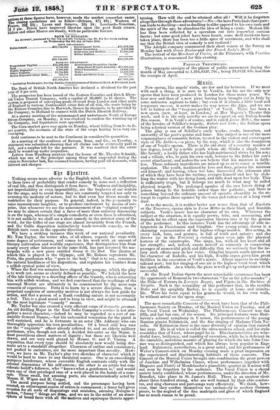[4r Nothing seems more adverse to the English mind, than
an adherence 'to those laws of probability that render comedy in some sort a reflection of real life, and thus distinguish it from farce. Weakness and insipidity, not improbability or even impossibility, are the bugbears of our writers for the stage, and to avoid them they are constantly tempted not only to overstep the modesty of nature, but to find even her freest moods too restrictive for their purpose. So general, indeed, is the propensity to raise inconsiderate laughter, or to produce excitement by means of sur- prise, that whenever we see the announcement of an "original comedy" we may be almost certain that a farce of more than ordinary dimensions
is on the tapis, whereas if a simple comedietta or even farce is advertised, it is not unlikely we shall see a short comedy in the strictest sense of the -word; for the trifles of our stage are almost invariably from the French, and the Gallic 'disposition instinctively tends towards comedy, as the British taste veers in the opposite direction.
We have a striking instance this week of our national peculiarity. Mr. Tom Taylor, the writer who, of all others, regards the stage with some degree of seriousness, and comes to his work with an amount of literary cultivation and worldly experience, that distinguishes him from nearly every other labourer in the same field, has just favoured the me- tropolis with a new piece entitled Going to the Bad. The theatre at which this is played is the Olympic, and Mr. Robson represents Mr. . Potts, the gentleman who "goes to the bad," that is to say, renounces the natural kindliness of his disposition, and regulates his conduct from a selfish cynical point of view. When the first ten minutes have elapsed, the purpose, which the play
is to work out, seems as clearly defined as possible. We behold the hero of the tale listening to a drawling officer of the Guards, who is saturating him with selfish wisdom, and we feel convinced that the teachings of the unsound Mentor are ultimately to be counteracted by the more sage counsels of experience. Potts is to learn by a severe discipline, that a perpetual suspicion of unworthy motives is not always the best Zende for :action, and that a person of a frank confiding nature is not necessarily -a fool, This is a good moral end to keep in view, and might be attained by the most legitimate " comedy " means.
Mr. Taylor has also created a very efficient corps of dramatis personce.
An old duelling Major in the East India Company's service is not alto- gether a novel character,—indeed he may be regarded as a sort of un- amiable General Damns,—but his unbounded veneration for the pistol is well sustained, and he is fortunate in an actor (Mr. Addison) who can thoroughly appreciate his iron peculiarities. Of a breed still less rare are the ' exquisite" officer already referred to and an elderly military gentleman, who, though not such a decided fire-eater as the Major, is most punctilious about matters of dignity ; but these are likewise well drawn, and are very well played by Messrs. G. and F. Vining. A requisition that every type should be absolutely new would bring dra- matic art to a standstill altogether. Clearness of outline and consistency, not pushed to etuicature,- are far more important than novelty. How- ever, we have in Mr. Taylor's play two sketches of character which it would be hard to trace to any theatrical source. One is an exceedingly Pompous hairdresser, whose execrable English contrasts oddly with the colossal dimensions of his self-esteem; the other is an astute but con- siderate bailiff's follower, who "knows what a gentleman is," and would warn one of that privileged race of a writ placed in the hands of a com- rade. These small, but amusing parts, are characteristically acted by Messrs. H. Wigan and H. Cooper.
The moral purpose being settled, and the personages having been
Created, an extravagant course of action is commenced; a fancy ball gives occasion for all sorts of disguisings and mistakes, amusing dialogue is spoken, " funny " things are done, and we are in the midst of an atmo- sphere of broad farce with all the motives and equivoque thereto apper-
taining. How will the end be attained after all ? Will it be forgotten altogetherthrough these adventures ?—No—the hero Potts finds that cynic- ism leads to duelling—and as duelling is alike opposed to his own taste and the spirit of the age, he abandons the idea of being a cynic. Modem life has thus been reflected by a speculum cut into somewhat curious facets ; but some good jokes have been heard, some droll incidents have taken place, there has been too a little spice of sentiment, and who shall say that the British idea of comedy is not realized ? The Adelphi company commenced their short season at the Surrey on Monday last with Green Bushes and Our French Lady's Maid. The revival of the Merchant of Venice, at the Princess's, with Venetian illustrations, is announced for this evening.
PARISIAN THEATRICALS.
The aggregate receipts of the places of public amusement during the month of May amounted to 1,204,652f. 70c., being 28,012f. 05c. less than the receipts of April.


























 Previous page
Previous page